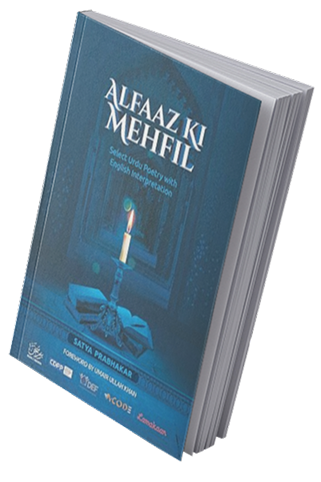
5 Urdu ash'ar / shayari (shers, couplets) by
Haider Ali Aatish
1778-1847,
Faizabad (Uttar Pradesh)
Haider Ali Aatish Biography
Biography
Aatish Lakhnavi, born as Khwaja Haider Ali in 1778, remains one of the most celebrated poets of the classical ghazal. His pen name, Aatish, meaning “fire,” perfectly reflected the intensity and brilliance of his verse. Though he was born in Faizabad, he later made Lucknow his literary home, a city that was then the heart of Urdu culture.
As a young man, Aatish was drawn into the world of poetry under the guidance of Mushafi Ghulam Hamdani. Mushafi’s influence sharpened his talent, but Aatish’s voice was distinctly his own. While his contemporary Imam Bakhsh Nasikh became known for technical precision, Aatish carved his place by focusing on the emotional depth of poetry. His verses spoke of dignity in suffering, longing, and the resilience of the human spirit.
Aatish’s ghazals became widely admired for their natural flow and heartfelt simplicity. He believed poetry was not merely about ornamental language but about capturing life’s truths. His collections, especially Deewan-e-Aatish, continue to resonate with readers who find in his words both elegance and compassion.
Despite his fame in literary circles, Aatish lived a life of modesty. He often turned away opportunities for wealth and grandeur, preferring a simple lifestyle that allowed him to remain true to his art. In his later years, he suffered the loss of his eyesight, yet his passion for poetry never dimmed. He continued to write until his death in Lucknow in 1847.
One of the most memorable aspects of his legacy was his rivalry with Nasikh. Their poetic contests are still remembered as defining moments of Lucknow’s golden age of Urdu literature. Beyond rivalry, Aatish also inspired a generation of poets, leaving behind disciples who carried his style forward.
Though personal details about his family life remain scarce, Aatish’s true legacy lies in his poetry. His verses remind us that the ghazal is more than just romance—it is philosophy, reflection, and the song of the soul.
Today, Aatish is remembered as a master who gave Urdu poetry its warmth and depth, a poet whose words continue to kindle sparks in the hearts of readers.
1 / 5: Haider Ali Aatish
ruuh bulbul ki
iraada rakhti hai parwaaz ka
having cut the wings,
may the hunter not rest content
the soul of the nightingale
is set on flying
0
0
2
2.7K
2 / 5: Haider Ali Aatish
nutq ne haivaan se
musht-e-khaak ko insaan kiya
can one truly be human
who does not value speech?
it is eloquence that
turned a lump of dust into a human
0
0
0
11
3 / 5: Haider Ali Aatish
bas ho chuki namaaz
musalla uThaayiye
springtime has arrived,
mystics, drink some wine
prayers are over,
roll up the prayer-carpet
0
0
1
4.0K
4 / 5: Haider Ali Aatish
hazaar ha shajr-e-saaya
daar raah mein hain
journey the only condition
generous companions many
thousands of shady trees
line along the path
0
0
0
3.1K
5 / 5: Haider Ali Aatish
asir hone ki
aazaad aarzoo karte
should they see the world of
shackles of your tresses
even free men would
desire to be held hostage
1
0
1
4.3K
Featured Shaayars
553 Shaayars
Featured Themes

Urdu Poetry, Simply Told
classic Urdu shers with simple translations, poetic insights, and mini-dictionaries for every poetry lover...
A heartfelt collection of Classic Urdu shers...



Alfaaz Ki Mehfil is a curated space for timeless poetry celebrating words, emotions, and the enduring beauty of expression. From classic Urdu couplets to modern reflections, it brings together generations of poetic voices that speak of love, longing, hope, and the human soul.
Quick Links
